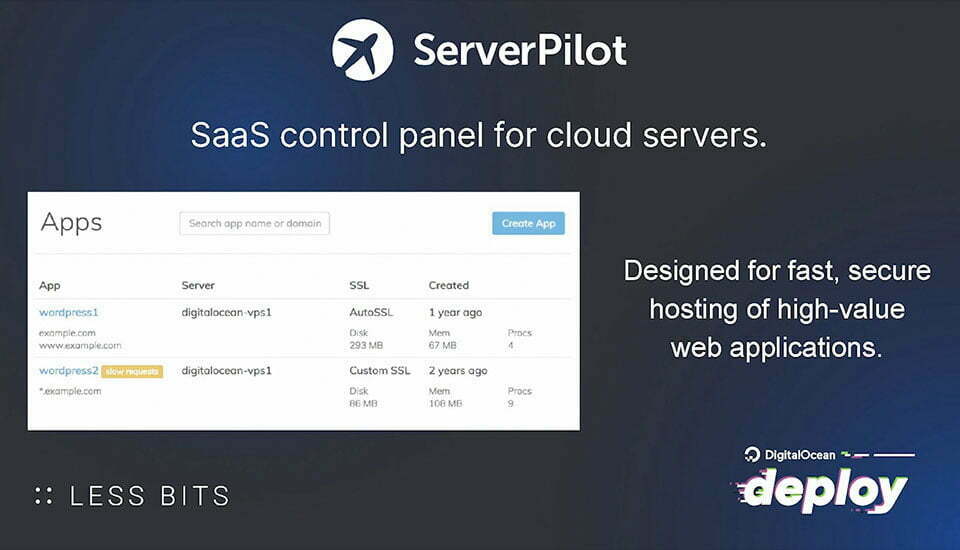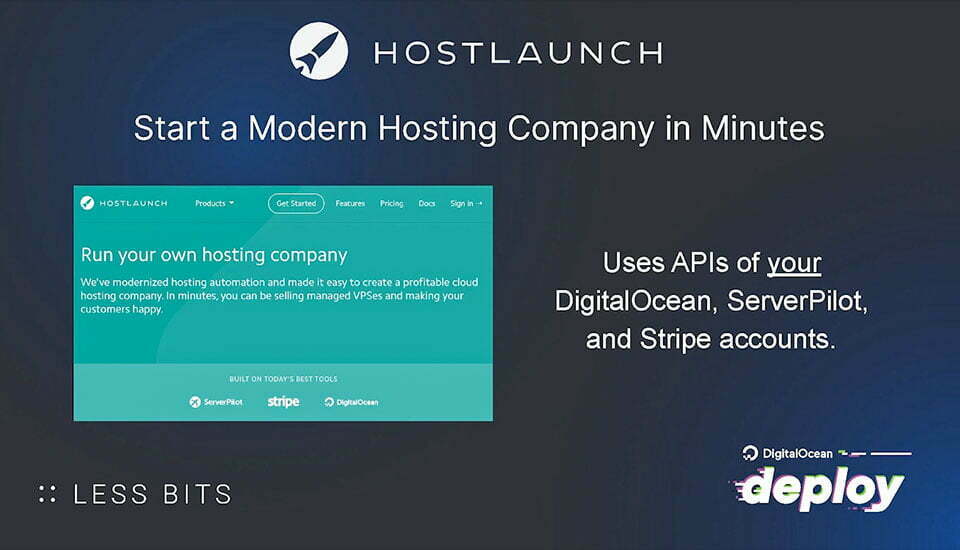I’m the founder of Less Bits. We make server management software, security software, and hosting automation software. I was originally a web developer and a sys admin. One of my first jobs was a programming job where I also was learning, and I became responsible for the company’s service security. And I just got really into security. I fell in love with security. I’d spend my free time just digging and digging, and I hit this point, this was the early 2000s, where I just realized I wanted to be a security expert, and I was going to have to go back to school and get a CS degree to get the fundamentals to truly do that.

So that’s what I did. I went back to school. While there, I got involved in research as an undergrad, I took time off even before grad school to do more research and went into a PhD program. I learned so much, with some of the work I did there, and I’m super, super proud of the impact that it had. For example, some of the work we did was finding Vulnerabilities of different effects in basically every major Linux distributions package managers, like, Red Hat, Fedora, Ubuntu, and Debian, even outside of the categories of these vulnerabilities, we found them even outside of Linux, like in BSDs.
And to exploit these, what it took was a man-in-the-middle attack, and we found that this was a situation where you didn’t need to take control of, like, network traffic, like intercept packets and this kind of thing. You actually could just volunteer to be a man in the middle essentially, because of the low barrier towards offering to become a community mirror for these different package manager repositories. It was amazing. We went and notified all of the distros so they could work on fixes before we announced these vulnerabilities.
In the process of our research, we collected lots of data from servers that were vulnerable to hitting the mirror that we ran. We saw like military computers, government computers, all these things, and knowing that all these systems were vulnerable, and the work that I had done had an impact on like, securing all of this. It was just absolutely amazing. And we published our research and moved on, and moved on to other research.
And that kind of practical immediate impact research is generally not the focus of academic research. For me, it’s that practical, immediate impact that really drives me. I wanted to build software and make an impact, and people can use it now. And seeing the huge opportunities that were happening with, you know, all the cloud progress that was happening, it just drove me from academia back into the industry.
Contents
The Cloud Hosting Revolution
I want to talk today about how modern clouds and software have just totally swung open the doors for entrepreneurs to take on old, established industries. There is a quote that says, “Success= Preparation + Opportunity”. So you may have seen this quote before or some variation of it. The original quote doesn’t say success, it says, instead it says luck. So, luck is what happens when preparation meets opportunity.
Well, since you’re here watching this, you know the world is changing, and you know that with all these cloud technology changes and so much changing so quickly that there are endless possibilities, and there are endless opportunities. So the opportunity is there, and you know it. That’s a fact right now. And add to that fact that you’ve been Also been on the forefront, learning, you’re watching this, you know what’s happening in the market and the industry. Keeping your eyes open, you’re prepared!
Increase opportunities for startups
So this is a unique time, you look at this statement, you know, and think about where that fits for you. Everywhere you look, costs are going down. Those are not only costs in dollars but also costs in time and energy. So like, cost of infrastructure management and just infrastructure itself, cost of development, cost of learning, cost of reaching customers, and cost of every service that you use, and there are new services being launched every day that help you save more time and more money, and do more with a smaller team.
Your ability, as a small or mid-size company, to compete with giant and established competitors just keeps increasing every day. And that means competition, both in reinventing those existing industries as well as defining completely new ones. And it’s long been said, you know you’ve heard before that new companies have an innovation advantage over established companies. And it’s true, and it gets more true every day. And you can just hear big companies explicitly talking about how they’re trying to act like start-ups, because they want to innovate, and they see that start-ups are eating their lunch.
But if any of you have seen the inside of a big company, you know that between the existing culture they’ve created, and how hard it is to change the direction of any big ship, they just don’t stand a chance against the right entrepreneur who understands how to build for this modern world. And so what are those things that you know that they don’t? Well, among some of them are the critical importance of simplicity and support for your customers, combined with providing them platforms to build their businesses on top.
Simplify work for everyone
So technology is inherently complicated, companies like Less Bits and DigitalOcean are simplifying. We’re taking things that were once difficult, and required huge time investments, and turning them into beautiful, easy, empowering tools and experiences. And add into that a clear focus on building trust and making your customer success through amazing support. And then on top of all that, instead of just selling your customer a product, actually knowing how to provide them a platform for them to innovate on top of, and build their business on top of. And that’s what we did with ServerPilot.

ServerPilot was our first product. We launched around the same time DigitalOcean did, I think DigitalOcean was 2012, we came out of beta in 2013. ServerPilot was borne from a problem I had been dealing with firsthand since the early 200s, which was managing a Linux server for hosting high-end client websites was just way more complicated than it needed to be. There was existing hosting control panel software on the market, but it was software that was built in the late ’90s, and it was built for the shared-hosting industry. They were trying to pack a lot of low-end, low-value customers on expensive, dedicated hardware. So that’s just a totally different market and totally different use case.
Migration to Cloud Hosting
I’ve been an early adopter of VPSes, and cloud servers since the early 2000s, and throughout 2000 I watched and continued to do server administration, I was doing ad work for agencies that had high-end clients, and famous brands that needed marketing sites for large financial companies. And they hosted their clients on cloud servers, but they used the same control panel software that was made for the shared hosting industry. Why? That’s all there was.
Years for me of being responsible for that stuff, dealing with the breakage on upgrades, security problems, compromises due to zero to exploits, terrible UX, just tons of like features that were obsolete or never needed in the first place packed in there because that was old software philosophy, just keep packing stuff in there, and that’s what value is. But I knew that I wasn’t the only one who needed something better than that, and it was clear that a greater migration was going to happen. It wasn’t just my frustration, cloud servers were getting cheaper, and there was only one direction it was going to go in.

The industry, while it was changing, and some of the web hosts out there, they didn’t care, or they were fine just extracting profit from what they already had. Which is fine, there’s nothing wrong or immoral about that. Others though did want to adapt, but they didn’t have the culture. They didn’t have the vision to do that. And it’s one of those things, that if a company isn’t built with that vision and that culture as part of its DNA, it just can’t develop that overnight. So when DigitalOcean launched, it caused an earthquake in the hosting industry. Suddenly, not only could you get a $5 cloud server rather than a $20 cloud server, but it was also just crazy easy to use.
DigitalOcean, they boiled it down. They made cloud servers unintimidating, why should you need to choose your partitions? Why shouldn’t your default option just be sane, opinionated ones? Why shouldn’t you have a server in just a minute with a couple of clicks? Why should you have to like feeling like an expert to have a cloud server? And since then, every hosting company has had its eyes glued to DigitalOcean.
They’re afraid. Every major hosting company’s executives are afraid. They talk about it. They’ve talked about it with me. They’re sitting on a cash cow, but as this mass migration happens and the world changes, they might get left behind. And you know, for the ones that don’t adapt, they probably should be left behind. It just shouldn’t be hard, in this day and age, to start an amazing hosting company in a world where there are things like DigitalOcean and ServerPilot.

HostLaunch
And well, that’s why we built HostLaunch. HostLaunch is built on what I think personally should be a really obvious concept, which is, why should it be hard to launch an absolutely amazing modern managed hosting company built on top of DigitalOcean’s ServerPilot and Stripe? So DigitalOcean has solved cloud servers. ServerPilot has solved server management. Stripe solved payments.
We don’t live in this world that gave birth to traditional hosting companies that had to go different colors to stuff their hardware in, write their own software or take off-the-shelf ancient hosting company software, fax forms to open a merchant account to credit cards. That’s not the world we live in. That’s what hosting companies do. That’s what they had to do. All of their software and culture and infrastructure, everything down to their bones is built like that. Instead, we made it so you can have your own hosting company in minutes on modern platforms. You just drop in your API keys for DigitalOcean, ServerPilot, and Stripe, set your prices, and you have your own awesome, amazing modern hosting company.
The New Business World With Cloud Hosting
So part of what’s going on with this new world of cloud infrastructure and services is that totally new architectures and business models are possible now. You can focus your innovation at a higher level. So for example, ServerPilot was the world’s first software as a service control panel. At the time we launched, it seemed crazy to some people because they thought that control panels are supposed to run on each server, and they’re supposed to expose a plain HTTP insecure web interface out there for the world, right? That’s just how it’s always been done and that’s how it’s supposed to be.
Same with DigitalOcean. When they launched, it seemed crazy to some people. Like how can you build a business when you have customers that want to pay $5 for a server? This was a world where the cloud was, People thought it was for enterprise. And $5 seemed like a stupid idea to people, well certainly not stupid or crazy now!
ModSecurity
So what other innovations are possible in a world where the number of cloud Servers is just exploding, and being used for every purpose imaginable, and being used by every user imaginable. So here’s another example from our latest product launch. An agent-based ModSecurity running on your server that allows you do to industry-standard web application firewall technology through a WordPress plug-in, and manage centrally as a task service.
So that’s a lot. But think about it. So for more than a decade, eager WordPress plug-in developers have been trying to roll their own WAF into PHP code. Why didn’t they just use the same industry-standard WAF engine, ModSecurity that the rest of the industry uses? You know, the same thing that like cloud uses and lots of enterprises use, why, because WordPress plug-ins are written in PHP and ModSecurity isn’t written in PHP. But why not run ModSecurity at a local agent, that the WordPress plug-in can talk to?
Well, 10 years ago, there wasn’t a market for it because everyone was on shared hosting, and you couldn’t just install your own server software. But as WordPress sites undergo this massive migration of cloud providers, like DigitalOcean, people have control over what runs on their servers. It’s a huge migration, as a huge percentage of DigitalOcean’s clients and customers and servers are WordPress and WordPress developers. So this is a whole new ball game for WordPress, and this is just one example. There’s so much room for innovation now with this massive shift of hosting to cloud servers, and that innovation doesn’t just have to be new developer tools.
Cloud servers or cloud hosting provided the ability for all businesses and startups to start their businesses and projects with low costs and simple administrative methods that do not require experience and effort. Now everyone can launch their project using cloud servers and compete with large companies. The world is changing, so what are you waiting for?






